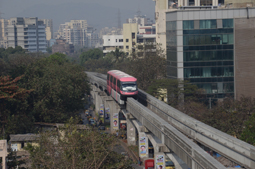In a decision that will impact the construction sector positively, the Union Cabinet has approved 100 per cent foreign direct investment under automatic route in the Indian construction-development sector. The amendment to the existing FDI policy on construction is in line with the budget announcement in July this year.
Conditions for FDI
However, the 100 per cent FDI will be subject to the following conditions:
* Minimum area to be developed under each project: In case of development of serviced plots, there is no condition of minimum land; in case of construction-development projects, a minimum floor area of 20,000 sq. metres, instead of 50,000 sq. metres earlier; and in case of a combination project, any one of the aforementioned two conditions will need to be complied with.
* The investee company will be required to bring minimum FDI of $5 million, instead of $10 million earlier, within six months of commencement of the project. The commencement of the project will be the date of approval of the building plan/layout plan by the relevant statutory authority. Subsequent tranches of FDI can be brought till a period of 10 years from the commencement of the project or before the completion of the project, whichever expires earlier.
* The investor will be permitted to exit on completion of the project or after three years from the date of final investment, subject to development of trunk infrastructure.
* The government may, in view of facts and circumstances of a case, permit repatriation of FDI or transfer of stake by one non-resident investor to another nonresident investor, before the completion of the project. These proposals will be considered by FIPB on case-to-case basis.
* The project should conform to the norms and standards, including land use requirements and provision of community amenities and common facilities, as laid down in the applicable building control regulations, bye-laws, rules and other regulations of the concerned state government, municipal and local body.
 * The Indian investee company will be permitted to sell only developed plots. For the purposes of this policy “developed plots” will mean plots where trunk infrastructure, including roads, water supply, street lighting, drainage and sewerage, have been made available.
* The Indian investee company will be permitted to sell only developed plots. For the purposes of this policy “developed plots” will mean plots where trunk infrastructure, including roads, water supply, street lighting, drainage and sewerage, have been made available.
* The Indian investee company will be responsible for obtaining all necessary approvals, including those of the building/layout plans, developing internal and peripheral areas, and other infrastructure facilities, payment of development, external development and other charges, and complying with all other requirements as prescribed under applicable rules, bye-laws and regulations of the concerned state government, municipal and local body.
* The state government, municipal and local body, which approves the building and development plans, will monitor compliance of the above conditions by the developer.
Affordable housing
According to the Indian government, these measures are expected to result in enhanced inflows into the construction-development sector consequent to easing of sectoral conditions and clarification of terms used in the policy. It is likely to attract investment in new areas and encourage development of plots for serviced housing given the shortage of land in and around urban agglomerations as well as the high cost of land. The measures are also expected to create much-needed low-cost affordable housing in the country and development of smart cities.
However, the government has clarified that FDI is not permitted in an entity which is engaged or proposes to engage in real estate business, construction of farm houses and trading in transferable development rights.
‘Real estate business’ will have the same meaning as provided in FEMA Notification No.1/2000-RB dated May 3, 2000, read with RBI Master Circular i.e. dealing in land and immovable property with a view to earning profit or earning income therefrom and does not include development of townships, construction of residential and commercial premises, roads or bridges, educational institutions, recreational facilities, city and regional level infrastructure, and townships.
Besides, an Indian company, which is the recipient of FDI, will procure a certificate from an architect empanelled by any authority authorised to sanction building plans to the effect that the minimum floor area requirement has been fulfilled.
Completion of a project will be determined as per the local rules and bye-laws and other state-level regulations.
Projects using at least 60 per cent of the FAR/FSI for dwelling units of carpet area not more than 60 sq. metres will be considered as affordable housing projects. In addition, 35 per cent of the total number of dwelling units constructed should be of carpet area 21-27 sq. metres for EWS category. Such projects can have a mix of EWS, LIG and higher category dwelling units and commercial units. Provision of servant’s quarters along with the main dwelling unit will not be counted as dwelling units for EWS and LIG under an affordable housing project.
The government has also permitted 100 per cent FDI under the automatic route in completed projects for operation and management of townships, malls and shopping complexes, and business centres.
Background
Investment in the Indian construction sector has a multiplier effect on the economy by way of infrastructure creation; substantial employment generation over the entire spectrum from unskilled workers to engineers, architects, designers as well as financial and other supporting services. Further, it creates demand for the products of a number of related industries including those in the manufacturing sector like cement, steel, fittings and fixtures, and others.
Besides, its employment and income generation potential, and greater investment in the sector would help to augment the available housing stock including affordable housing and built-up infrastructure for different purposes. Increasing the affordable housing stock is an urgent need in order to stem the proliferation of slums in and around the cities.
The construction sector witnessed a steady rise in FDI from 2006-07 to 2009-10 after which the levels of inflows were lower. Therefore, in order to step up investment in construction development, with its backward and forward linkages for many other sectors of the economy, the government felt that some liberalisation and rationalisation of the FDI policy on construction could be the necessary catalyst to boost the sector.
| VIEWPOINTS | |
| ‘FDI decision will bear fruit in 8-12 months’ | |
| — Shishir Baijal, Chairman & Managing Director, Knight Frank India | |
 |
Overall this is a positive move and only reflects the government’s intention towards reviving the sector. Relaxing FDI norms will open up the capital markets thereby attracting investment into the sector. It’s also a great fillip for affordable housing which only creates more opportunities in the market, especially for investors, who will benefit the most with the three-year lock-in period now being revised. However, we need to understand that FDI will not begin flowing within the next 24 hours as we foresee another 8-12 months for the decision to bear fruit. |
|
|
|
| ‘Economic growth will gather momentum’ | |
| — M. Murali, Managing Director, Shriram Properties | |
 |
I would say this is an excellent positive announcement the government has made appreciating the contribution of construction sector to the economy and the nation as well. The economic growth will surely gain further momentum with easier funding norms for FDI. Easy and more money to the construction sector would mean, more jobs! More houses! Needless to say, the still faster growth of ancillary industries.With relaxations like dropping the minimum 10-hectare rule for serviced housing plots, slashing the minimum floor area for construction development project to 20,000 sq. metres from 50,000 sq. metres to be eligible for overseas investment, halving the minimum FDI amount to $5 million from $10 million, easing the exit norms – there would be definitely more and easy foreign fund flows into the sector.The existing rule of a three-year lock-in after the completion of minimum capitalisation of $10 million is relaxed. This is a big attraction and incentive to foreign investors. Now the investor can exit on completion of the project or three years after the final investment, of course, with the rider of completion of trunk infrastructure.From the developers’ side, the new norms will definitely help the medium size developers who suffer from funds crunch to get easy funding |
|
|
|
| ‘100% FDI to give fillip to real estate sector’ | |
| — Sanjay Dutt, Executive Managing Director – South Asia, Cushman & Wakefield | |
 |
The approval of the Cabinet to the revisions in norms for allowing 100 per cent FDI in construction is a step that will be beneficial for the next phase of urban development as envisioned by Prime Minister Narendra Modi under the ‘100 Smart Cities’ project.Relaxation in the development size will benefit Tier II & III cities where large projects typically suffer from poor demand. Further, locations around the Golden Quadrilateral and Delhi-Mumbai Industrial Corridor can also look at reaping benefits out of this as new FDI will also be attracted to new towns and cities planned in these corridors. However, the revised policy will first help in infusion of investment in housing development projects in metropolitan locations in the suburban and peripheral locations as well as for niche housing projects in city centre locations of Delhi, Mumbai and Bengaluru.Keeping in mind the fact that the proposal is more attractive now, it will help attract investment in the sector from funds that want to limit their exposure. However, the details of the proposal will have to be evaluated before enunciating the complete benefits. Further, the government would have to ensure that process of acquisition and approval on real estate and construction projects is streamlined to ensure minimum delays to make investment environment more conducive for global investors. So far one of the main concerns has been the delays in commencement and completion of projects in India.There is already an improvement in FDI in construction this year with a number of foreign sovereign and pension funds already committing funds to Indian real estate not only through fund managers, but also through direct agreements with local developers in projects, clearly indicating higher confidence in Indian real estate markets. The total FDI in the construction and development sector was recorded at Rs. 36 billion ($0.6 billion) in H1 2014 (January-June 2014), a 58 per cent increase from the same period in 2013. |
|
|
|
| ‘I see improvement in overall investor sentiments’ | |
| — Vineet Relia, Managing Director, SARE Homes | |
 |
This is a positive move from the Government of India which will, no doubt, pave the way for more such progressive policies and will boost the real estate sector. The relaxation of the two norms will improve the overall investor sentiments and increase the inflow of investments. The reduction of the minimum built-up area to 20,000 sq. metres will give builders more space to operate, especially in urban locations where there is a problem of land shortage as well as high cost of land.Moreover, the exemption of the projects which commit 30 per cent of their total cost to affordable housing is a measure which will give a big thrust to the affordable and mid-income segments. These measures will also support the developers to pursue housing projects which will be the backbone of the government’s ‘Smart City’ dream. I am confident the sector will now start moving on a fast-growth trajectory. |
|
|
|
| ‘Bigger reforms are required to do business in India’ |
|
| — David Walker, Managing Director, SARE Homes | |
 |
The government’s announcement of easing of funding rules for FDI in construction sector is welcomed as a step in the right direction. However, it does not constitute the big reforms that are required to attract the approximately $1 trillion over five years (2012-17) to overhaul its infrastructure sector such as ports, airports and highways to boost growth.Bigger reforms are required to make it easier to do business in India. India’s ranking has recently slipped by two points to 142 out of 189 countries. Performance falls even further when you consider two areas that are critical to the real estate business; dealing with construction permits 182 out of 189 and enforcing contracts 186/189.In terms of direct support to the residential sector, availability of finance is a critical area with mortgage debt in India only circa 9 per cent of GDP vs. China with circa 35 per cent and the UK with over 70 per cent. Buying a home is one of the best investments available and so encouraging and incentivising families to buy via finance offerings is good policy.With progress on these fronts FDI investment will naturally flow to India, attracted by the tremendous potential of the size of the population, increasing earnings and urbanisation. |











